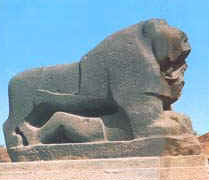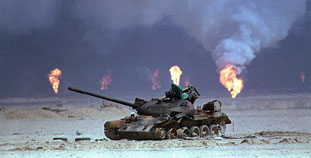
A chronology of key events in Iraq's history:
 |
| Babylon lion statues still stand today. (AP photo) |
3100 BCE - The civilization of Sumer, with city states,
which develops systems of irrigation, trade and writing.
c. 1760 BCE - King Hammurabi, the most famous ruler of
Babylonia, consolidates power in Mesopotamia region.
637 A.D. - Muslim Arabs conquer region.
762 - Baghdad, a new capital for the Caliphate is founded
on the river.
1258 - Mongols destroy Baghdad, massacre its citizens,
and execute the Caliph. The economy of Iraq takes centuries to recover.
1917 - British occupation of Baghdad begins.
1921 - Faysal of Hijaz (now: southwestern Saudi Arabia), is crowned Iraq's first king.
1932 - Iraq becomes an independent state.
1933 - Faysal dies. His son, Ghazi, succeeds him.
1958 - The monarchy is overthrown in a military coup led
by General Abd-al-Karim Kassem and Abd-al-Salam Muhammad Arif. Iraq is
declared a republic and Kassem becomes prime minister. The king, the crown
prince and the prime minister are killed.
 |
| King Faysal (AP photo) |
1963 - Kassem is ousted in a coup led by the Arab Socialist
Ba'ath Party(ASBP). Arif becomes president.
1968 - A Ba'athist led-coup ousts Arif's successor and
General Ahmad Hasan al-Bakrbecomes president.
1972 - Iraq nationalizes the Iraq Petroleum Company (IPC).
1979 - President Al-Bakr is put under house arrest. Vice-President
Saddam Hussein becomes new president. Hussein purges the Ba'ath Party,
executing about 400 members.
1980 - Iran shells Iraqi border towns (Iraq considers this
as the start of the Iran/Iraq war). Iraq invades Iran, and gets quickly
control over Iranian land. The U.S. opposes any Security Council action
to condemn the invasion. U.S. soon removes Iraq from its list of nations
supporting terrorism and allows U.S. arms to be transferred to Iraq.
1984 - U.S. restores diplomatic relations with Iraq.
1988 - Chemical attack on Kurds in the town of Halabjah
in northern Iraq. Thousands die. A ceasefire agreement ends Iran-Iraq
war.
1990 - Iraq invades Kuwait in August.
 |
| Saddam Hussein
came to power in 1979. (AP photo) |
1991 - The Gulf War starts when the coalition forces begin
aerial bombing of Iraq ("Operation Desert Storm"). In March,
Iraq accepts the terms of a ceasefire. In April, Iraqi forces suppress
rebellions in the south and the north of the country.
1992 - A no-fly zone, excluding flights of Iraqi planes,
is established in southern Iraq, south of latitude 32 degrees north.
1993 - U.S. forces launch a cruise missile attack on Iraqi
intelligence headquarters in Al-Mansur district, Baghdad in retaliation
for the attempted assassination of US President, George Bush, in Kuwait
in April.
1995 - UN Resolution allows the partial resumption of Iraq's oil exports to buy food and medicine ( the "oil-for-food program"). In October, Saddam Hussein wins a referendum allowing him to remain president for another 7 years.
1998 - Iraq ends all forms of cooperation with the UN Special Commission to Oversee the Destruction of Iraq's Weapons of Mass Destruction (Unscom). In December, after UN staff are evacuated from Baghdad, the USA and UK launch a bombing campaign, "Operation Desert Fox", to destroy Iraq's nuclear, chemical and biological weapons programs.
 |
| Devestation from the Gulf War, 1991. (AP photo) |
2000 - Reopening of Baghdad airport, followed by a stream
of international flights organized by countries and organizations to campaign
against sanctions. The flights are labeled humanitarian missions to comply
with UN sanctions on commercial flights into and out of Iraq. In October,
Iraq resumes domestic passenger flights, the first since the 1991 Gulf
War. Commercial air links re-established with Russia, Ireland and Middle
East.
2001 - Britain, United States carry out bombing raids to try disable
Iraq's air defense network. In July, Britain and the U.S. fail in attempt
to overhaul the UN sanctions, which they say are widely abused and lead
to an unnecessary burden of suffering on civilians. They have been pushing
for "smart sanctions." In August, the World Health Organization
team arrives for a survey into cancer and birth defects. Iraq alleges
that cancer rates have soared in areas of the south that where bombed
with weapons containing depleted Uranium during the 1991 Gulf War.
